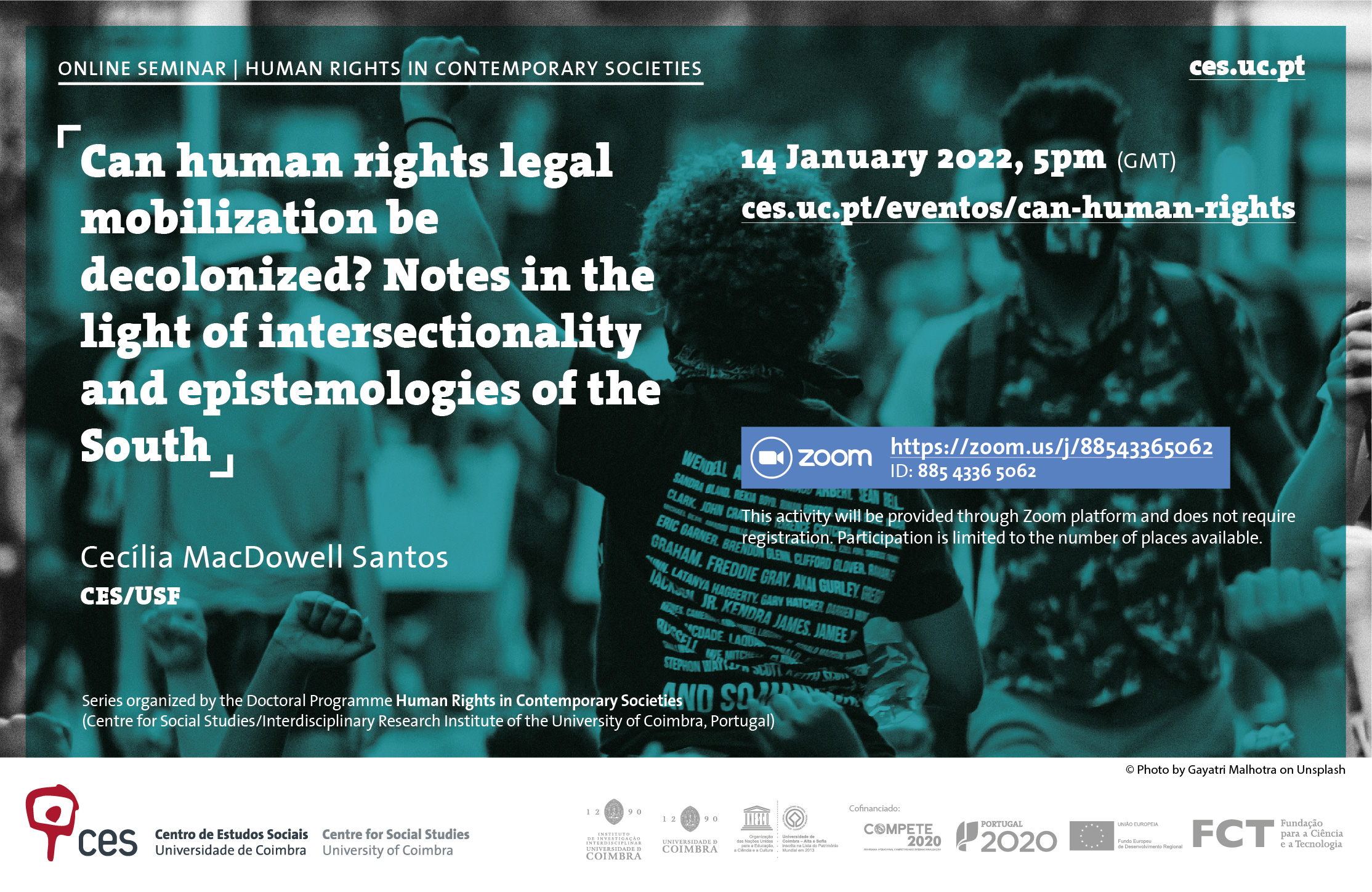Seminar
Can human rights legal mobilization be decolonized? Notes in the light of intersectionality and epistemologies of the South
Cecília MacDowell Santos (CES/USF)
January 14, 2022, 17h00 (GMT)
Online
Overview
The liberal perspective on human rights is based on an abstract conception of humanity and dignity. It’s centered on states and norms that compose international, regional and national systems of human rights defined by laws, judicial precedents, and jurisprudence. In this perspective, individual rights are privileged over collective rights. Violations of norms and the implementation, compliance and diffusion of norms define the framework of human rights and legal mobilization for human rights. The literature on legal mobilization, as developed in the United States, does not center only on states and individual rights. It also pays attention to discourses and practices of social movement actors and non-governmental organizations. However, most studies on transnational legal mobilization of (or for) human rights adopt an institutionalist perspective on both legal mobilization and human rights.
The postcolonial critique of human rights questions the North-centric legal construction of the international normative system of human rights, and calls attention to the plurality of human rights discourses, narratives and struggles taking place in historically marginalized communities both in the global North and South. Going beyond critical human rights theory, an emerging literature on decolonizing theories and practices of human rights decenters the states, individual rights, legal institutions (national and international), and non-governmental organizations.
The focus is on historical injustices and inequalities produced by both states, inter-state systems of human rights, and non-state actors. Instead of norm violations, the starting points to think about human rights and practice legal mobilization are the multiple and intersected historical injustices, as well as the knowledges born in struggles for both social and cognitive justice. Intersectionality theory, as proposed by Black feminist intellectuals such as Patricia Hill Collins, and the epistemologies of the South framework proposed by Boaventura de Sousa Santos, offer illuminating pathways to envision a decolonizing conception of human rights based on knowledges and practices born in struggles in the margins. This seminar will reflect on the possibilities of decolonizing human rights legal mobilization from the perspective of these two theoretical frameworks, and how they complement each other.
The examples of human rights legal mobilization will draw on research that I have conducted about Brazil and the Inter-American System of Human Rights, as well as research by other scholars on “people’s lawyering” (also known as “militant lawyering”) and struggles for human rights of Afrodescendent rural communities and indigenous peoples in Latin America..
Bio note
Cecília MacDowell Santos holds a PhD in Sociology from the University of California-Berkeley and a Master in Law from the University of São Paulo. She is Researcher at the Centre for Social Studies (CES) at the University of Coimbra and Professor of Sociology at the University of San Francisco (USF). At CES she is a member of the Research Group on Democracy, Citizenship and Law (DECIDe), co-coordinates the PhD program on "Human Rights in Contemporary Societies" and teaches for this and the PhD program "Sociology of the State, Law, and Justice". Her current research interests center on two subject areas: discourses and practices on violence against women and legal mobilization of human rights at the local, national and transnational scales. Within the first subject area, she has studied the relations between the State, the criminal justice system and the women's movements in Brazil, with a focus on laws and policies to confront domestic violence against women. Regarding the second subject area, she has studied transnational mobilization practices for women's human rights, indigenous rights, and the right to political memory, especially in the contexts of Brazil and the inter-American system of human rights. She has also focused her studies on transnational legal mobilization of human rights in the Portuguese and European context. She is the author of Women's Police Stations: Gender, Violence, and Justice in São Paulo, Brazil (Palgrave Macmillan, 2005), editor of A Mobilização Transnacional do Direito: Portugal e o Tribunal Europeu dos Direitos Humanos (Almedina Press, 2012), and co-editor of Quem Precisa dos Direitos Humanos? Precariedades, Diferenças, Interculturalidades (Almedina Press, 2019), Desarquivando a Ditadura: Memória e Justiça no Brasil (Hucitec Press, 2009) and Repressão e Memória Política no Contexto Ibero-Brasileiro: Estudos sobre Brasil, Guatemala, Moçambique, Peru e Portugal (Ministério da Justiça do Brasil, 2010). Her work has also been published in several edited volumes and peer-reviewed international journals, including Latin American Research Review, Latin American Perspectives, Cadernos PAGU, Revista Estudos Feministas, Journal of Human Rights Practice, Sur-International Journal on Human Rights, among others..
Organization: Doctoral Programme in Human Rights in Contemporary Societies
______________________
This activity will be provided through Zoom platform and does not require registration. Participation is limited to the number of places available > https://us02web.zoom.us/j/88543365062 | ID: 885 4336 5062
Please keep the microphone on mute until the discussion is open. The host may remove disruptive participants.
Open activities in digital format, such as this one, do not grant a declaration of participation. Such document will only be guaranteed in events with prior registration and regulated access.


